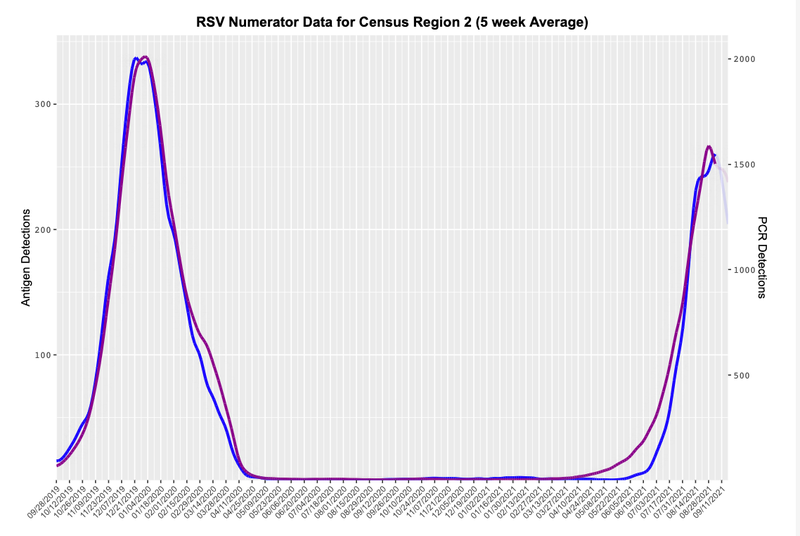(WWJ) RSV, a respiratory virus, is on the rise in metro Detroit.
WWJ Health reporter, Dr. Deanna Lites, said RSV usually shows up in winter; but made an early appearance this year.
“We started to see RSV really starting to rise over the summer…” Dr. Matthew Sims, director of Infectious Disease Research at Beaumont Health System, told Dr. Lites. “When the mask mandate stopped in mid-July, RSV cases started going up right away.”
The Centers for Disease Control and Prevention (CDC) said RSV—Respiratory Syncytial Virus—presents with symptoms like the common cold such as runny nose, coughing, fever, sneezing, wheezing and decreased appetite.
Almost all children will contract an RSV infection by the time they turn two, according to the CDC.

Get a better look a the graph and other CDC surveillance data here
Most people can manage the infectious virus at home with over-the-counter fever reducers and painkillers such as ibuprofen and acetaminophen (never give aspirin to children); drinking fluids; and keeping in touch with their healthcare provider. More information on how to care for a child with RSV here.
The CDC said most people recover within a week or two.
RSV enters the body through the eyes, nose, or mouth. It spreads when an infected person coughs or sneezes causing droplets to linger in the air; or from direct contact with an infected person.
Babies, especially those under six months old, remain among the most vulnerable to complications from the infection. Most can be cared for at home. The National Library of Medicine reported, based on analysis of data gathered between 2000 and 2005, the average RSV hospitalization rate for children under 2 years old was about 5.2 per 1,000; and, in children under two months old, about 18 per 1,000. A baby may need to go to the hospital if he or she is dehydrated or has trouble breathing.
Most of these hospitalizations only last a few days, according to the CDC.
The CDC reports an average of about 58,000 hospitalizations among children younger than five-year-olds across the U.S. each year.
People over 65 also remain vulnerable to the virus. On average, 177,000 adults in this age group are hospitalized with RSV in the U.S. and 14,000 die, according to the CDC.
No vaccine exists for RSV, unlike COVID-19 and the flu. Medical experts recommend you or your child get tested for both coronavirus and RSV should symptoms arise.

